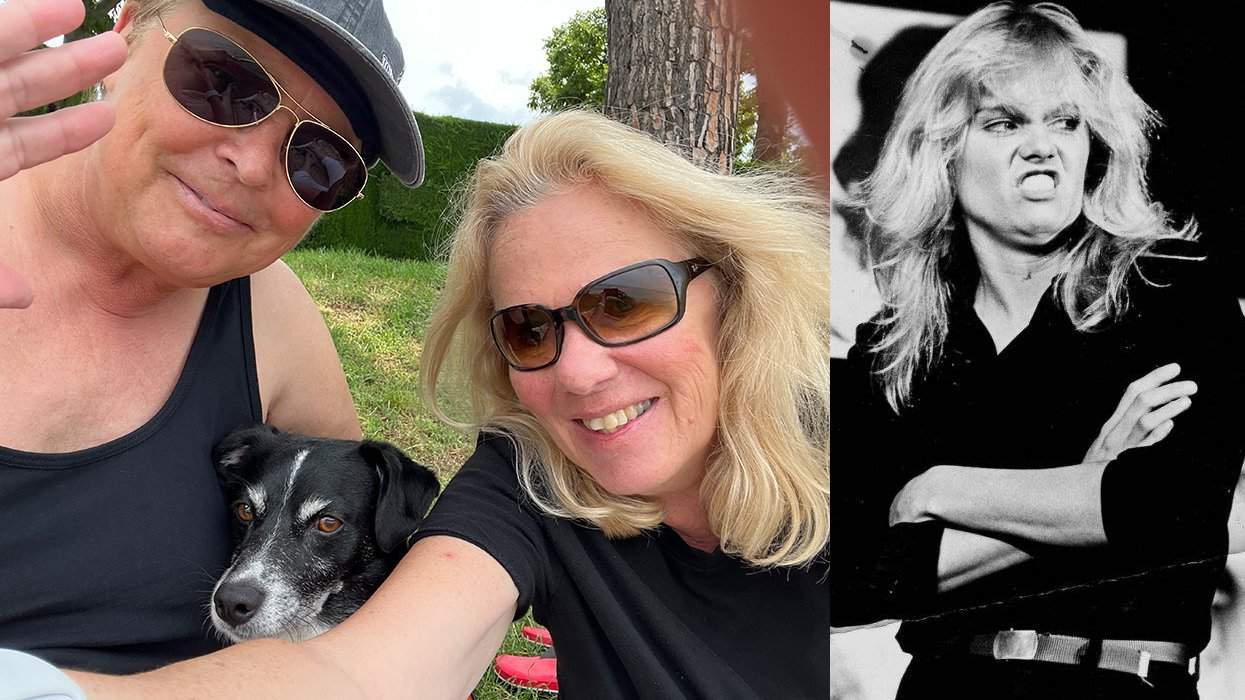Back in 1994, Lois Bromfield came out on television. Candidly, on one of late-night television's most popular shows.
Lois has done everything from stand-up comedy to writing for one of 90s television's most iconic shows, Roseanne. "I asked [Roseanne] for a job...She said, 'Great, okay, you can work on the fucking show,'" Lois recalls with a laugh. The opportunity catapulted her into television writing, where she thrived for over a decade. It was during that journey that she married fellow gay comedian Steve Moore. One of many lavender marriages of the time, it provided them accessibility and security when being out and proud was met with adversity.
But like many comedians, she got her start in the comedy clubs, including West Hollywood's The Comedy Store. On that stage, she performed one of her best-known skits, "Sorority Girls from Hell," an overly dramatic retelling of a fictional film while on a date. While performing at a comedy club one night, actor-songwriter Michael Nesmith was in the audience and enjoyed the skit, who later offered Lois an opportunity to perform that skit on his NBC show. The comedic bit became a cult favorite in many gay bars where she later performed. "I walked into The Revolver, and there it was on the TV," she recounts. "They were playing it, and [the bar patrons] were saying all the lines."
Lois's journey also took her to the stages of queer clubs, which became safe havens and fertile ground for her comedic growth. "The drag performers are some of the sharpest minds on stage," she said. "Watching them taught me to be fast and made me a better comic." These clubs also provided a vibrant and supportive community, starkly contrasting the more hostile environment she often faced in mainstream venues.
In an era where being openly gay could end a career, Lois dared to be different. Three years before Ellen DeGeneres' character came out as lesbian in 1997, Lois did publicly on the late-night The Arsenio Hall Show in 1994. It was a bold move that had significant repercussions. "I lost a ton of jobs," she reflects. A year later, her lavender marriage ended a year after Arsenio Hall, with Moore himself coming out about his sexuality and his HIV status in the mid-90s.
Her move to Europe brought a fresh perspective. "Living in Los Angeles...you're just in this really wonderful fantasy capsule. But when you leave, you realize there's really bad things going on in the world," she explained. The shift broadened her worldview and enriched her comedic voice, adding depth and insight. "When I performed in London and Berlin, they loved it," she shared. "There's no cringing." This acceptance was a stark contrast to some of the hostile environments she faced in the U.S., where she feared hinting at her sexuality could turn the audience against her.
She now lives in Germany with her partner of many years.
Reflecting on her decades-long career, Lois highlighted the evolution of the comedy scene. "There's a ton more women, and they're saying everything and anything," she observed. The freedom and diversity in today's comedy world starkly contrast to her early years' limitations. "You couldn't say the word vibrator, but a guy could get up and talk about his wife's vagina." Her story is not just one of personal triumph but also a narrative of cultural change, highlighting the progress made and the work still needed in the fight for acceptance and equality.
"From the time I came out on Arsenio Hall to now...the change is unbelievable," she reflects. "I can't tell you how many times I get up on stage, I go, 'I'm a dyke.' It's just great."
At times, authenticity is a luxury some can't afford. One can lose family, friends, and community in the search for self. And while there may be moments of joy and adversity, Lois's journey reminds us of the power of always staying true to ourselves.
Voices is dedicated to featuring a wide range of inspiring personal stories and impactful opinions from the LGBTQ+ and Allied community. Visit Advocate.com/submit to learn more about submission guidelines. We welcome your thoughts and feedback on any of our stories. Email us at voices@equalpride.com. Views expressed in Voices stories are those of the guest writers, columnists and editors, and do not directly represent the views of The Advocate or our parent company, equalpride.





































































Charlie Kirk DID say stoning gay people was the 'perfect law' — and these other heinous quotes